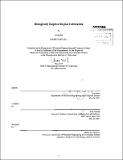Biologically inspired digital fabrication
Author(s)
Han, Sarah (Sarah J.)
DownloadFull printable version (3.925Mb)
Other Contributors
Massachusetts Institute of Technology. Department of Electrical Engineering and Computer Science.
Advisor
Neri Oxman.
Terms of use
Metadata
Show full item recordAbstract
Objects and systems in nature are models for the practice of sustainable design and fabrication. From trees to bones, natural systems are characterized by the constant interplay of creation, environmental response, and analysis of current structural constituents, as part of a larger dynamic system. In contrast, traditional methods of digital design and fabrication are characterized by a linear progression of three main stages: modeling (digital generation in the digital domain), analysis (digital mapping of the physical domain), and fabrication (physical generation of the digital domain). Moving towards a system process where modeling, analysis, and fabrication are integrated together for the development of a dynamic process will transform traditional fabrication technology and bring about the creation of sustainable and more efficient synthetic environments. Integration of modeling, analysis, and fabrication into one fluid process requires the development of a fabrication platform with capabilities for real time control. This thesis explores and investigates the creation of a framework for real time control of industrial robotic arms as part of a multipurpose fabrication platform.
Description
Thesis: M. Eng., Massachusetts Institute of Technology, Department of Electrical Engineering and Computer Science, 2013. Cataloged from PDF version of thesis. Includes bibliographical references (pages 37-40).
Date issued
2013Department
Massachusetts Institute of Technology. Department of Electrical Engineering and Computer SciencePublisher
Massachusetts Institute of Technology
Keywords
Electrical Engineering and Computer Science.